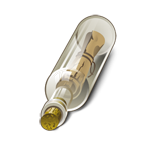Tags

You would think that having someone find one of your messages in a bottle would be an amazing stroke of luck, but this guy had two of them found by two different people on the West coast of Iceland 🙂 They were apparently sent seven years ago, from about 200 miles west of the Orkney islands, by a crewmember on a Danish ship.
Tvö flöskuskeyti frá sama manninum
Two messages in a bottle from the same man
Tvær íslenskar konur hafa fundið flöskuskeyti frá sama danska manninum nú í júnímánuði. Skeytin fundust bæði á vestanverðu landinu en Breiðafjörður skilur skeytin að.
Two Icelandic women have found messages in bottles from the same Danish man in the month of June. The messages were both found on the west coast of the country, on opposite sides of Breiðafjörður.
The word skeyti means telegram or cable according to my dictionary, but in this compound just means message. The first part is made up of the genitive of flaska (bottle, flask), so you have flösku·skeyti. There are other compounds where the meaning it adds isn’t as clear, like flug·skeyti (missile) or tundur·skeyti (torpedo). I guess you could still think of those things as “messages”, of the fiery explosive kind at least. Or perhaps the “cable” aspect implies some kind of “remote” idea, sending whatever from a distance.
You could use any of the other compass points as well with -verður, so austan·verður for east side, norðan·verður for north side, etc.
I believe the phrase skilur skeytin að comes from the expression að skilja (eitthvað) að, which means to divide something in two. So I think what it’s saying is that the messages were both found on the west coast, their locations separated by Breiðafjörður?
|
|
|||||||||||||||||||||||||||||||||||||||||||
Jørgen Sønderkær, danski skipverjinn sem sendi flöskuskeyti 200 mílum vestur af Orkneyjum fyrir sjö árum, ætlaði sér greinilega að einhver fyndi það. Þetta segir Steinunn Rán Helgadóttir en hún fann flöskuskeyti frá honum í byrjun júní er hún gekk í fjörunni við Sellátranes í Patreksfirði.
Jørgen Sønderkær, the Danish crew member who sent the messages 200 miles west of the Orkney islands seven years ago, clearly intended for someone to find them. This according to Steinunn Rán Helgadóttir who found a message from him at the beginning of June while walking along the shore at Sellátranes in Patreksfjörður.
There an interesting example of when to use the subjunctive in the phrase að ætla sér að, to intend that (something happen). He intended that someone find the messages, and here fyndi is the past subjunctive of finna.
Fréttablaðið greindi frá því í gær að ung kona hefði gengið fram á flöskuskeyti í fjöru á Snæfellsnesi, en það var frá Sønderkær. Steinunni brá því í brún þegar hún fletti Fréttablaðinu í gærmorgun. „Ég hef geymt skeytið í dagbókinni minni og fór um leið og athugaði hvort þetta væri ekki eins,“ segir hún.
Frettabladid reported yesterday that a young woman had come across a message in a bottle on the beach in Snaefellsnes, and that it was from Sønderkær. Steinunn was amazed when she read the paper yesterday morning. “I’ve kept the message in my journal and immediately went to check whether it was the same one,” she says.
The phrase að ganga fram á seems to mean to come across/upon.
You can see the verb að bregða which takes the dative in the phrase Steinunni brá því í brún, meaning to be surprised/amazed at something. In this case Steinunn (a woman’s name) is in the dative; if you wanted to talk about yourself it might be mér brá því í brún þegar… (I was amazed when…). You can also use bregða alone (without því í brún) to mean shocked/startled/taken aback.
I translated fletta as simply reading here, but it has several meanings related to taking/peeling something off. I think it is used for turning pages in a book or newspaper, and gets the reading connotation from there. Maybe “flipping through”? I found the expression það er engin blöðum um það að fletta, meaning “there is no doubt about it”. You will also see fletta used for “looking up a word in the dictionary” – að fletta upp orðinu í orðabókinni. Note that it takes the dative.
|
|
|||||||||||||||||||||||||||||||||||||||||||||||||
„Ég sendi manninum línu í byrjun júní en hef ekki fengið svar.“ Hún segist hafa reynt að hafa uppi á Sønderkær en hann sé ekki á Facebook. „Mér datt í hug að þeir sem kynnu að leita í dönskum símaskrám gætu fundið hann. Nú, ef hann er þá ennþá til.“
“I dropped him a line at the beginning of June but haven’t received an answer.” She says she has tried to find Sonderkaer but he isn’t on Facebook. “I thought perhaps someone who could search the Danish phonebook might locate him. If he’s still around, that is.”
I hadn’t seen að hafa uppi á einhverjum before, an interesting phrase meaning to find someone.
flaska (f) bottle, flask skeyti (n) telegram vestan·verður adj the west side skip·verji (m) crew member (on a boat) skilja að divide in two fjara (f) beach, shore bregður í brún be amazed, startled hafa uppi á einhverjum find somebody greini·lega adv clearly
